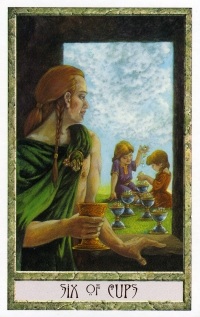 I found out today that an acquaintance from high school is very ill, possibly dying. It's actually the second time I've suddenly lost a friend from that time; the first was about three years ago. What surprises and amazes me is that while my relationships with the two people were incredibly different, all the same things came flooding back. The memories of who I was then, the comparison of who I am now, became a steady stream as if someone had just unplugged a pipe. And oddly, a lot of my thoughts weren't so much about my friend or my acquaintance as the other people who knew them, and who they might have grown up to be.
The Druidcraft Tarot version of the Six of Cups illustrates it here: there's a part of old identities that do stay with us no matter where we go. The rough, awkward times especially, the times when we were first sorting through all the unpolished knobby bits towards figuring out who we really are. You see it in sitcoms, the joke about how the polished, accomplished person used to be "really awkward" as a kid. A little part of us may always worry that we are who we were, not who we become. If things were especially awkward and painful - as a lot of childhood often is - then we might worry our accomplishments are even a sort of mask under the "real thing".
I was told once that everyone has a story, something about their experience, their own unique world, that transforms them and leads them towards their purpose. I'm inclined to agree. We aren't just our present. We're our past, slowly taking the first steps into the light, forming the imperfectly perfect foundation of what we're going to be. We're our future, looking back from a lifetime of experience, able to see our moments of fear as blips on a radar of evolution. We're alternate roads, things we might have done - or not done, or feared to do - that turned us into different people. Our life is a constant road of evolving, changing, becoming, regressing, and becoming again. We are such brilliant beings. And we contain multitudes.
Everything we are now is a little bit of who we were. Everything we were is a bit of what we're going to be. And it is all important. Every single sad, awkward bit. Every bright, triumphant moment. The roads we've traveled are a part of us, even when we think we've left them behind. But that's all right. In fact, often, that's the only way it should be.
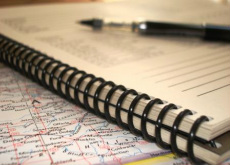 One of my favorite bits of advice about using the Tarot for daily guidance and growth comes from the book "Tarot Journaling" by Corrine Kenner. The book is a really extensive guide to using Tarot cards as a prompt for daily journaling, one of the best ways I know to both learn the cards and gain some insight into yourself.
The advice was this: if the card you draw doesn't seem to fit you or your situation, start writing about that. Write about how it doesn't fit you at all, about how it was a mistake to draw that card. Write about why you can't possibly learn from it. By the end of your writing, you'll see why it was the card you were meant to draw all along.
When we perform divination for ourselves, we're all at the risk of seeing what we want to see. We draw another card "just to be sure", or interpret things in the broadest possible terms. It's one of the reasons even Tarot readers get readings from others: sometimes we just can't be objective about our own situation.
But when our purpose in reading is to spiritually delve, to see what we can dig up within ourselves, it's important to understand that there really are no accidents. There are many, many paths to the heart. Sometimes, in discovering what doesn't feel right, you can make room for what does. Sometimes in asking the wrong question, you stumble how it leads to the right one.
It's an excellent lesson for life as well: don't wait for it to be the "right" moment. Keep going, do the work, and the road will lead you to the answers you're meant to find.
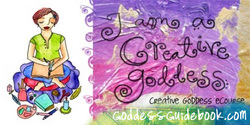 I'm a natural, lifelong learner. Really, when it comes to courses and books and things that'll enrich and improve my life, I'm a bit of a magpie grabbing at shiny things. But I'm going to lay it out here: a lot of my business is just beginning, my goals are just starting to be planted and to sprout. There are a ton of things I want to learn and do and take part in. And I can't do them all right now - I have to be very, very discerning. I can't make any big investments the way I'd like to unless I know they're The One. And the one big commitment I've made is in Leonie Dawson's work.I've already spoken a bit about Leonie Dawson in the past, but I did want to give you another look at some of the transformative power of what she creates. There's such a giving, sunshine-y spirit behind what Leonie creates for women, and she's constantly creating and giving others a powerful boost all the time. For those of you just tuning in, Leonie Dawson runs the Goddess Circle, a seriously awesome group of women who want to celebrate their inner goddesses while connecting in the form of a virtual women's circle. Yes, this is an affiliate post - but I wouldn't promote anything I didn't 100% use and love myself. Through the Circle, I've already met an awesome variety of women, who are willing to support each other in business (blog trading and website review), creativity, or if they just need to vent. That'd be worth the $199 a year for membership alone - but Leonie has a huge assortment of course and meditations about business, creativity, health, chakras, you name it. And she offers all of that free to anyone who joins the circle. A lot of sites tout how they're giving thousands of dollars worth of content away for just (insert whatever arbitrary price here). But I legitimately believe that's what Leonie is doing, providing a great price for a ton of great work. Through Leonie, I've been turned on to so many awesome women, and given so many new ideas about ways to improve my life and awaken my inner goddess. She hand-paints the ebook pages of her courses, and infuses them with such a gentle, supportive spirit that you can feel her giving you a lift through the page. In just six days, she'll be beginning her six-week Creative Goddess e-course, and I'm super excited to be taking part. If it's anything like her business course, and her 30 Days of Goddess course, it provides a lot of excellent information while giving a big lift to the spirit. I'm unable to offer you a full review just yet, but I did start the Creative Goddess course a little bit early, feeling the need for a creative boost. Along with a beautiful boost to my creative juices, the first week's 30-minute meditation gave me a huge feeling of tranquility and inner power. It taught me to contact my inner older, wiser self, a concept I'd never really explored before. That's something I want to return to again and again, any time I feel not-enough for whatever I want to accomplish... and I know we've all had that time. The Creative Goddess e-course is $89 dollars if you don't want to join the Goddess Circle and get everything else that goes with it, $199 if you do. And it is seriously, seriously worth it.
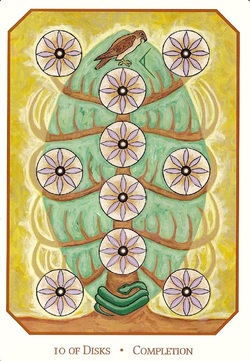 For this week's Card of the Week, we have the Ten of Pentacles reversed, from the Babylonian Tarot by Sandra Cicero.
I really like the simplicity of this deck's style while adding a lot of details that add depth to a reading. While I don't know anything about Sumerian cosmology, the illustration for the Ten of Pentacles (which is given the keyword 'completion' here) puts me in mind of the Kabbalah's Tree of Life. The hawk at the top of the tree, and the snake at the bottom, put me in mind of "as above, so below", the idea that the heavens are reflected here on earth and vice versa. On a more mundane level, I think it's only too appropriate that there's often a lot of plant imagery in the Pentacles suit. It's the card of practical, solid things, and of growth in the earth, so what better symbol for the culmination of all that than a tree?
Numerology-wise, the Tens mean the end of one cycle and the beginning of another. When you're dealing with the Ten of Pentacles, you're looking at a stable home or family, a job with a solid foundation, a business established and thriving. But if we're keeping the tree metaphor in mind, it's like fruit that's ripe and ready for harvesting. We reap the rewards, but that doesn't mean the tree stops growing. We tend and care for it, getting ready for the next cycle of growth. And if we don't pick the fruit in time, it grows overripe and we miss our chance.
I think that's the reversal coming into play - letting your stability turn stagnant or useless, not turning it into a fresh cycle of new growth. Or you could not recognize the good thing when you have it, and fail to take advantage of or appreciate it.
This week, think about the elements of your life that are exactly where you want them to be, completely satisfying. Are you practicing gratitude for the blessings in your life? And are you staying where things are prosperous and safe, or are you preparing yourself for the next challenge? The only constant in life, after all, is that we're always continuing to grow.
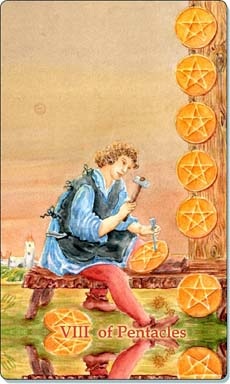 A lot of people look at Tarot as a way to go deeper into their own lives. That's what I do: helping people shed light on the patterns and energies in their lives, giving them a better look at where to go next. But what I love about the cards is they can be so versatile. Sometimes even a day-to-day question can get you strikingly specific results.
The time I couldn't get in touch with a friend, for instance, so I consulted the cards and drew The Moon (needless worry) and the Four of Wands (a celebration). She was at a festival that day, and couldn't get to her phone. Or this weekend, when my computer was being an absolute delight, and I hadn't heard from my tech support forum of choice for hours. The Magician told me I had the tools I needed to tackle it myself, and while I didn't fix everything, I did manage to get my Internet back online.
Of course, it's probably not always going to be effective if you rely on a deck of cards to tell you what to have for dinner tonight. But it makes for an interesting way to flex your reading muscles. Part of being an effective reader, after all, is letting your intuition stretch you just beyond the classic meanings of the cards into a new mode of thinking. (How would you use the cards to decide what's for dinner? Six of Cups means a favorite childhood meal? The Tower means something spicy with bold flavors?)
It's not good to let Tarot do all your thinking for you, of course, and it's an easy trap to start relying on it too much. Ultimately everything should rely on your own decisions and common sense. But give the Tarot a spin for an unusual question sometime, and see what muscles it flexes in your mind. It just might surprise you.
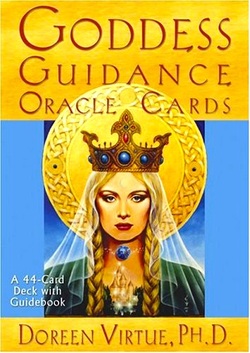 I have a confession to make, and it's one I've been putting off for a long time.
I've been experimenting...
With oracle cards.
The Doreen Virtue Goddess Guidance cards, to be specific, with the sparkly gold edges the pretty, soothing pictures of gorgeous women. The sweet, "non-threatening" messages.
And okay, okay, I jest. There is nothing wrong with oracle cards - they're lovely! And fascinating! There's so much variety! But I was always a bit skeptical about Ms. Virtue. Not because she's doing it wrong - no one is doing it wrong. But I didn't know if she was for me.
I don't know if I believe in Indigo children, you see. Angels and faeries do incredible things for some people, magickally and spiritually - I've met just as many people who say these are powerful forces you don't want to mess with idly. (I've got no idea how they got such a different set of references.) And then there's Doreen Virtue's Tarot deck, in which she claimed she'd removed anything "threatening" or "scary" - when really, the only thing scary about Tarot is how it might tell you there's things in your life that need a little work. Why would I want to avoid anything that might tell me the truth?
But I kept running into these cards, over and over again. Different readers would pull them to supplement a reading. They were out for display at my favorite occult shop, and I couldn't stop staring at them. And finally, a financial windfall came my way to treat myself to some Amazon goodies, and I put them on the order list.
What strikes me first about these cards is the artwork. It's so lush and also so varied, in different styles and forms of expression that let you really feel the personality of each goddess as the cards express them. You could use these cards meditatively if you like, delving into the details of each image and seeing what stands out to you. Or you could just treat the goddess in each card as a friend and a guide, as the deck encourages you to do. That'd trouble you, obviously, if you come from a faith that views these figures as literal beings who want to be called on and honored in a specific way, but as I'm more from the "facets of the same diamond" camp, I see the cards as having a unique energy that they bring with each individual message.
In general, oracle cards tend to be more specific than Tarot, more on point. That doesn't allow for a reading of more than a few cards, and it doesn't delve into complexity, but it provides an excellent springboard for deeper work. Reflecting on the energy of a single card can provide a lot of journal fodder, or maybe researching the nature of that goddess beyond the surface, learning the deeper aspects of her particular message. (I do wish the guidebook provided a little more insight into each individual goddess, and the legends that informed her message.)
There really is a lot of variety for "gentle, non-threatening" messages. Ishtar encourages you to set healthy boundaries, and Green Tara tells you that this may be a time to avoid harsh situations or environments. Kwan Yin tells you to be compassionate towards others, but most of all towards yourself. I realized very quickly that giving yourself kind, careful messages doesn't always mean avoiding truths. Certainly a few daily draws have already given me a lot of food for thought. But much like Tarot, it's up to me how deep I choose to go, whether I do the reflective work on what a particular card might mean to me. That provides a bit of extra responsibility on the part of the seeker, but I can't think of anything less coddling than that.
While Tarot's definitely my one true love as far as divination's concerned, I think I can count this experiment a success.
A Note From Kim: With my life coaching certification complete, I'm now available for free discovery sessions, one-time deep exploration, and monthly packages! To celebrate, have a look at this great little video from Tim Brownson (adaringadventure.com), who gives some great pieces of advice for all of us. We're all our own coaches first and foremost!
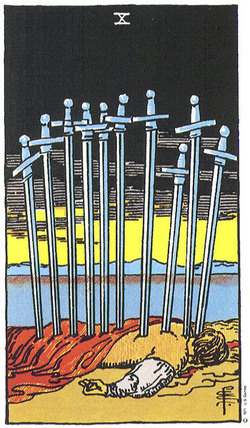 Have you ever encountered something that just makes your eye start twitching and your fingers start drumming? The kind of thing where no matter how much you try to practice non-judgmental bliss, it can sometimes just get to you? Here are a few things I've seen in Tarot that get under my skin.
1. "Gypsy" fortune teller acts. First of all, "Gypsy" is actually a really insensitive word. A lot of people don't know this, so don't feel horrible if you used it up to now or anything. But it's a big-time slur in Europe, and it isn't even accurate, considering it was used to refer to the Romani people because they "looked Egyptian" and no one could be bothered to ask them for the facts. Kind of like "Indians" referring to Native peoples in North America.
The actual semantics aside, if you're reading Tarot more for the entertainment than the counseling angle - and that is totally fine, seriously, as long as you make it clear that's what it is - then you can probably find a sparkly costume to do it in without an accent and the words "cross my palm with silver." Come on, guys. There are like six stereotypes that plays on, and not enough people know what they really refer to.
2. "Bad" cards. People who are reading for themselves tend to do this. A reversal is "bad". The high Swords cards or the Tower are "scary". The Star in the "what to watch out for" position means "you are heretofore advised to throw yourself into a pit of despair and never be optimistic again."
You can read everything super-literally if you want, and I get it if you want the cards to just serve up a slice of truth: "No, the job probably isn't on the way. And also you should probably look out for the bolt of lightning that's going to shake your world up. Just warning you." But I feel like I'm watching a mime box himself in. The problem isn't how you're reading, when you do it this way, it's how you're responding to what it says. I honestly can't, in my heart of hearts, believe your inner guidance and a hand from the Universe is simply saying "Your life will suck right now."
Why is there going to be a bolt from the blue, or a feeling of total despair? You're never helpless in your life, and rarely does anything just happen to you, so determine what's going to show up in your world and decide how you want to feel about that. Adjust circumstances accordingly. Maybe you're not supposed to get the job because there's a better one on the way. Or the sudden, painful revelation will lead to you reinventing your world in a way you'd never have been able to before. Tarot is never just about things happening to you. It's about looking at the road you're on, where it's leading, and if you want to change direction.
3. "They're doing it wrong!" Yes, before you ask, I see the irony here. But seriously, I can't stress this enough. Yes, there are close-minded ways of catering your reading to exactly what you want to hear, or responding to your reading from a place of fear. And that's not good for your learning, or what you get out of reading Tarot. But I'm talking about the methods you pick up and the teachers you choose. There is no end-all-and-be-all as far as that's concerned. The only way you could possibly be "doing it wrong" is if you learn one way, stop there, and refuse to learn anything else. The more information you gather, the more you can decide for yourself what's worth doing and how.
But, here's the real reason for this one: even if you work for years and decide the best way to learn or teach or read the cards or whatever else, please don't be a jerk about it. I have seen a few Tarot experts and instructors call each other out, often by name. I've seen them get judge-y for having a different opinion, teachinga certain way, charging a certain amount of money. I can't think of anything that turned me off faster than watching a seminar from an instructor, and listening to them smugly outline how their teaching was superior to someone else's book.
Everyone learns differently. Everyone responds to the cards differently. Don't limit yourself by stereotypes, by fear, or by inaction. But most of all, don't ever limit someone else by telling them there's only one way to tap into the cards. Tarot is far too elaborate, magical, and full of potential for that.
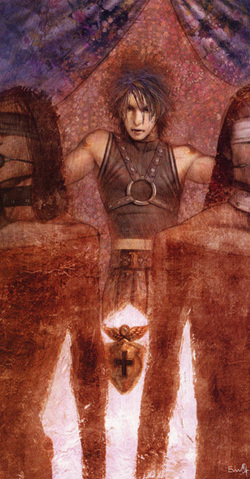 "Absolute power corrupts absolutely."
"The power of man has grown in every sphere, except over himself."
"If you want to test the mettle of a man, give him power."
When you're trying to grow anything of your own - confidence, creativity, self-love or self-discipline - power eventually comes up. What has power over you? What do you have power over, and what should you be able to control?
We're taught, probably for a good reason, to be afraid of having too much power over the world around us. After all, will we really know how to use it wisely? Will we wind up becoming one more person in a long line of bullies, acting only in our self-interests? Or are there institutions that have had power over us for too long, and is this the only way to make a stand?
The Tarot has a lot of cards about power, and in writing my upcoming course, I was surprised at how much crossover there was in just the first six. There's the Magician, who is a magical student, adept, or a stage magician and a shyster depending on who you ask. There's the Emperor, a ruler of men, and the Heirophant, a ruler of our traditions and institutions.
That's to say nothing of the cards that come later, such as the Chariot and Strength, who in many decks come right after each other. To me that's the story of "hard control" vs "soft control", of the times you have to take life by the reins and steer, the times you have to gently tame your inner beasts and demons. It's the Chariot I decided to put up as an illustration for just that reason. And wouldn't you know, my randomizer selected the Lunatic Tarot by Evan Yi Feng. It's one of the first decks I've ever seen where the charioteer isn't pulling horses, or a dark and light Sphinx, but instead is in command of human beings. That's scary - but the beauty of it is when you take a look at that illustration, if it's drawn in your reading, and say "am I exercising control or abuse of a situation?"
There are so many ways to use power, so many ways to define what it even is or where it belongs. That's why to me, power itself isn't a dirty word. We're afraid to call ourselves powerful, to say we have any kind of control. We think it'll make us scary, selfish, or egotistical. But if you don't have power over anything, ultimately it has power over you. You lose any kind of hold you might have over your own life, or the life you want to make for yourself.
"With great power comes great responsibility." And if you don't acknowledge your potential for power, you don't take responsibility for what's happening around you. The beauty of the Major Arcana is that we've been all its figures at one point, or will be someday. We've taken charge or been stuck in tradition, we've fought our problems with gentle grace or by reigning them in. If you don't like the role you see yourself playing, you can understand the part it's playing in your life, and make the choice to transform into another.
And that's the ultimate power over, and responsibility for, your own life. So who will you decide to be today?
|








 RSS Feed
RSS Feed

